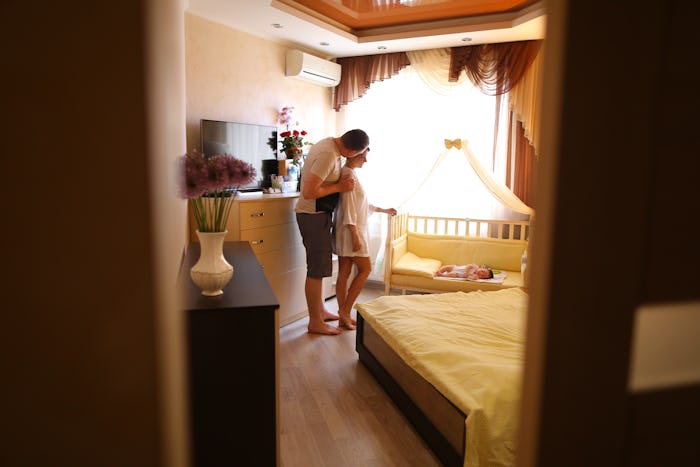Life

Do Babies Sleep Better In Their Own Room, Or Are You Stuck With A Tiny Roommate?
When you bring your baby home from the hospital, there’s only one thing that matters — sleep. But even if you swore during your pregnancy that your baby would only snooze in her crib, lack of sleep might make you a desperate momma. At this point, you might not even care where your kiddo gets her Zs, as long as you can score some, too. Which might make you question if babies sleep better in their own room — or with you?
Sleep deprivation is a very real thing when you come home from the hospital. And as much as people tell you you’re going to be tired, nothing can prepare you for that agonizing ache for sleep. So if you’re looking for a place to put your baby down for what will hopefully be a long nap, you might be surprised to know that she'll sleep best in your bedroom. "Since it's normal for babies to experience separation anxiety at bedtime, many experts believe that allowing them to share a room with you helps them feel secure so that they can sleep soundly," Meg Riley, a certified sleep science coach, tells Romper.
But there are other advantages to having your baby sleep in the same space as you. "In the early months, parents and babies do benefit from sharing the same room,” Dr. Lisa Lewis, M.D., a pediatrician and author of Feed the Baby Hummus, tells Romper. “If a mother is breastfeeding, she can easily access her little one by sleeping in the same room.” Plus, it can cut down on your own parental anxiety. “Room sharing also helps reduce parental angst,” says Dr. Lewis. “You know the baby is close by and that provides comfort.”
Room sharing isn’t just about comfort and cuddling, though. It can also keep your baby safe, too. “Studies show that room-sharing is linked to a reduced risk of SIDS (Sudden Infant Death Syndrome),” says Riley.
Sure, sharing your digs with your baby can be good for the first few months, since it allows for faster and easier access to your little one. Just don’t plan on making her a permanent resident in your bedroom. “When a baby above 7-8 months of age is sleeping in the same room as their parents, it often negatively impacts sleep,” Eva Klein, J.D., a certified infant and child sleep consultant, tells Romper. “This is because older infants and toddlers are extremely aware of their environment and surroundings.” Because nothing can shut down shut-eye more than a drooling (but totally adorbs) 7-month-old sitting up in their crib playing a loud game peek-a-boo at you at 3:00 a.m.
So if it’s possible (and you’re up for it), having a little pint-sized roomie might make sense for the first few months of your baby’s life. And after that, it might be time to nudge her towards her nursery, so you can both get a good night’s sleep.
Study cited:
Blair, P, Fleming, P, Smith, I, Platt, M, Young, J, Nadin, P, Berry, P, Golding, J. 1999 “Babies sleep with parents: case-control study of factors influencing the risk of the sudden infant death syndrome.”
https://www.ncbi.nlm.nih.gov/pmc/articles/PMC28288/
Experts:
Dr. Lisa Lewis, M.D., a pediatrician and author of "Feed the Baby Hummus"
Meg Riley, a certified sleep science coach
Eva Klein, J.D., a certified infant and child sleep consultant
This article was originally published on